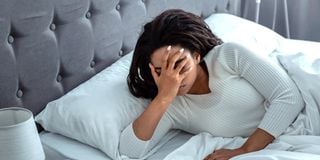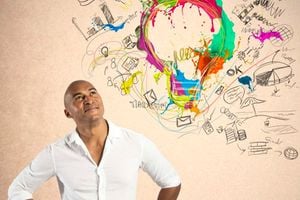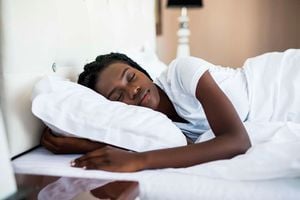
For many people, getting uninterrupted sleep comes easily. When the lights go off, they do not have to count sheep or listen to water sounds for them to sleep for eight straight hours or longer
Then others can barely sleep. They have gone to the lengths of making sure the bedroom is quiet and dark, all gadgets are off, or they drink a little alcohol, but they still cannot sleep.
Among those who are suffering from sleep disorders is George Odera, a language teacher at a private primary school in Nairobi’s Mathare Constituency.
He first developed sleeping problems following the death of his close friend in May 2020. The lack of sleep, he says, interfered with his home life, teaching schedule and social life.
“It started during Covid-19 when I lost a close friend. We spoke throughout the night but the next day, I got word that he died. From that point on, I couldn’t get any sleep. Whenever I went to bed, I couldn’t even close my eyes because I kept thinking that whatever happened to him would happen to me,” says Mr Odera.
He continues, “Since then if I manage to sleep, it is only for four hours. I wake up feeling tired because I toss and turn all night, and when sleep finally comes, it is time to prepare myself (for the day). It has affected my job, and my relationships with other people because I can’t concentrate. When sleep comes- even when I am in class teaching and I feel sleepy or get dizzy, have headaches and can’t continue teaching I have to get a few minutes to go and rest so that I can get back to my routine,” says Mr Odera.
His sleeping disorder has also taken a toll on his family life because when everyone else in the house is asleep; he is awake with all the lights on, working while he waits for sleep “to come.” This, he says, affects his children who end up not getting quality sleep.
Olivia Achieno, a Health Records Officer at Kitengela Medical Services also faces sleeping challenges. Hers began when she started working longer hours, from 8 am to 7pm, compared to the past when she worked fewer hours.
With new working hours, it took her four hours to commute to and from work and by the time she reached home, her sleeping hours had been cut short.
“I began developing health issues. I lost weight, had acute pain in my right leg and lower back, suffered poor concentration at work and chronic tiredness. I decided to get medication for the pain. In the hospital, my weight, oxygen levels, blood pressure and health history were checked.”
“A conversation about my lifestyle revealed I was having sleep issues because I was constantly worried about work, about beating traffic, and fear of getting reprimanded at work for being late. I would go to bed at 11 pm and be up by 4:30 am to prepare for work, and breakfast for my children,” says Ms Achieno.
After being given medication for her pains, she was advised to work on her sleep hygiene habits by reducing the night chores and going to bed earlier than 11 pm, and preparing her children’s breakfast the previous night.
She followed the recommendations and now reports that she feels more rested, is more energised and has less body aches.
Like Mr Odera and Ms Achieno, millions of Kenyans do not know that they are living with various sleeping disorders. Myths and misconceptions shroud sleeping problems.
People assume that those who snore loudly and sleep deeply are okay yet they have a condition called apnea which lowers the levels of oxygen in the body.
“There have always been many stories of people dying while they are sleeping. Sleep apnea might not kill you during the night but it is a risk factor for developing high blood pressure. When we see young people with high blood pressure that cannot be explained and there is no family history of it, then we have to rule out sleep apnea. It is also a risk factor for getting strokes. One is also at the risk factor of developing heart attacks,” says Dr Samuel Nyaga, an ear, nose and throat surgeon at the Nairobi Hospital who also specialises in sleep disorders at The Sleep Diagnostic and Treatment Center in Kileleshwa.

Dr Samuel Nyagah, ENT specialist who also treats sleep disorders at the Sleep Diagnostic and Treatment Center in Kileleshwa during an interview at Nairobi Hospital on March 11, 2024. PHOTO | EVANS HABIL | NMG
He says sleep issues related to insomnia tend to develop when someone experiences momentous events in their lives such as grief, studying for an exam or preparing for an interview.
Insomnia can also develop when one abuses alcohol and drugs; or because people are 50 percent genetically predisposed to experience it. For sleep apnea, he says that people with Body Mass Indexes beyond 30 are at risk of developing snoring and apnea.
Nelson Saitu, a Nairobi-based counselling psychologist says that there are biological and social reasons why people are struggling to sleep including too much light and noise, metabolic issues such as indigestion, underlying illnesses such as high blood pressure and diabetes as well as psychological factors such as mental illness like anxiety, depression, post-traumatic stress disorder and trauma.
When the nation asked Mr Saitu about Mr Odera’s sleeping symptoms, he said the teacher has a classic case of insomnia.
“When you are anxious, you are always afraid and constantly on the edge. It is the same when you are depressed because of overthinking and overfeeling. These factors can cause someone to develop insomnia where one either sleeps little or develops hypersomnia where they sleep too much,” says Mr Saitu.
A Harvard Medical School research faults spicy foods, eating large meals and taking too much caffeine, lack of exercise, pain such as arthritis aches, restless leg syndrome where one has a “creepy, crawly feeling” and uncontrollable movements of their limbs at night, depression, stress for the rising cases of poor sleep habits.
Dr Nyaga cautions that a person who snores too loudly stops breathing for seconds in between snores, sleep-walks, talks at odd hours of the night or falls asleep during odd hours of the day, should see a physician for his or her health history to be investigated and physical examinations conducted; and then see sleep specialists in the event they have sleeping disorders.
“A condition like insomnia is straightforward because it is when someone has problems falling asleep, maintaining sleep and waking up before the usual waking time. Here, we don’t do a sleep study because you can’t do it on someone who cannot fall asleep, unlike narcolepsy- a condition where people have an excessive urge to fall asleep,” says Dr Nyaga.
Peter Kamau, a sleep technician at The Sleep Diagnostic and Treatment Centre conducts sleep studies.
A sleep study begins with a consultation.“Once eligible, you come in, we get your patient history and do an examination such as finding out the size of your tongue and vocal cords which may be obstructing your airway, and then we do an overnight sleep study. Some of the common disorders we treat here are apnea, insomnia, parasomnia, narcolepsy and restless leg syndrome. The common stressors we found among our patients with sleep issues were weight, age and lifestyle,” says Mr Kamau.
A patient comes to the lab, goes about his or her evening routine like they would at home, has dinner at 7pm and goes to bed at 10pm.

A polysomnography test, a sleep diagnostic tool, is then carried out when a patient is asleep using a machine to measure the level of apnea a person has. The monitoring parameters are brain waves, eye movements, heart rate, breathing pattern, snoring and other noises made, blood oxygen level, body position, chest and abdominal movement, limb movement and sleep quality.
“I’ve dealt with two severe cases. One of them was a person who was snoring while awake. You’d talk to them and you can hear them snoring. For him, it was more of his weight affecting him because the heavier you are, the more your breathing becomes impaired. In the second case, it was a child who was unable to concentrate in school. After every five to ten minutes, he fell asleep,” says Mr Kamau.
According to 2022 data on sleep disorders prevalence from the Kileleshwa-based Sleep Laboratory, 40 percent of their patients were diagnosed with insomnia while 30 percent were diagnosed with sleep apnea.
In their findings, more men suffered snoring and sleep apnea compared to women while more women suffered insomnia compared to men.
Additionally, 15 percent of their patients presented with narcolepsy while another 15 percent were diagnosed with parasomnia, where people make abnormal movements, and talk while sleeping although their bed partner might think one is awake.
Once a sleep study is complete, a patient is then directed to other healthcare professionals at the Sleep Lab including psychiatrists, neurologists, cardiologists and psychologists.
The recommended healthcare professional then maps out a treatment plan- whether one has to go on medication, use a continuous airway pressure machine that cures apnea 100 percent in older people according to Dr Nyaga, undergo surgery if they have large adenoids, see a psychiatrist or psychologist or simply improve their sleeping hygiene.
Mr Odera did not visit a sleep clinic but has found coping mechanisms. He takes a lot of water and reduces his screen time and now reads books before sleeping. Compared to four years ago, he has slightly improved his sleep quality.
“You’d rather read a book than hold your phone. You should not eat and go to sleep immediately. We recommend you take your dinner three hours before your bedtime. Avoid coffee from 4 pm or 5 pm and if you decide to be sleeping at 10 pm, sleep at the same time every day and wake up at the same time every day. Avoid night lights too,” advises Dr Nyaga on good sleep hygiene habits.
If you are wondering if you have a sleep disorder, Dr Nyaga recommends self-evaluation.
“There are self-administered questionnaires we use in hospitals called the Epworth Sleepiness Scale that asks questions about a patient’s sleepiness and everything related to it. From the score you get, it may indicate if you have a sleep disorder or not,” says Dr Nyaga.








